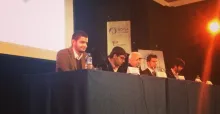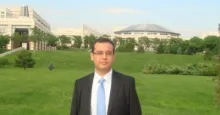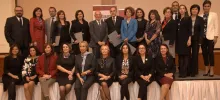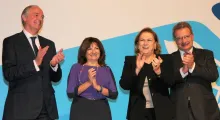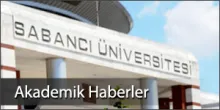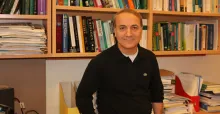Graduate students will be accepted for the 2013-2014 Spring Semester leading to the M.Sc. and Ph.D. degrees in the following programs.
Detailed information on research areas including basic sciences can be obtained at http://fens.sabanciuniv.edu.
Academic inquiries should only be posted to contact names for each program given below; for administrative or procedure related questions please contact to Student Resources Office.
Phone: (0216) 483 9093, E-mail: studentinfo@sabanciuniv.edu
Biological Sciences and Bioengineering
The program emphasizes the latest developments and technological innovations in this globally emerging field. Areas of specialization include molecular and cellular biology, bioinformatics, and plant biotechnology.
Academic Contact: Batu Erman,
Phone: (0216) 483 9530,
E-mail: batu@sabanciuniv.edu
Computer Science and Engineering
Research areas; natural language processing, pattern recognition, formal methods, software engineering, cryptography and information security, network security, computer architectures, distributed systems, database systems, data mining, computer graphics and virtual reality, embedded systems, knowledge representation and reasoning.
Academic Contact: Cemal Yılmaz,
Phone: (216) 483 9532,
E-mail: cyilmaz@sabanciuniv.edu
Electronics Engineering
Research areas; wireless communication, wireless networks, sensor networks, signal, speech and image processing, computer vision, pattern recognition, data networks, RF, microwaves, antennas and propagation, RF MEMS and RF Circuit design, photonics and fiber optic telecommunication, high-speed electronic devices, microsensors and microelectromechanical systems, medical and industrial ultrasonic imaging, medical instrumentation, analog and digital VLSI design, ASIC and FPGA design, computer-aided design and testing.
Academic Contact: Ayhan Bozkurt,
Phone: (216) 483 9537,
E-mail: abozkurt@sabanciuniv.edu
Industrial Engineering
The program focuses on production and service systems, integrated manufacturing, supply chain management, logistics, joint inventory-pricing decisions, product development process, modeling and analysis of manufacturing processes and equipment, manufacturing and technology strategies, fuzzy systems, combinatorial optimization and operations research approaches to telecommunication and energy systems. Emphasis is given to close collaboration with the industry.
Academic Contact: Güvenç Şahin,
Phone: (216) 483 9619,
E-mail: guvencs@sabanciuniv.edu
Energy Technologies and Management
Energy security is one of the most important issues of the global economy. Developing renewable, sustainable, secure, efficient, smart energy solutions is critical both for economic development as well as social welfare. With the growth of energy sector in the world and in our country day by day, and with increasing investments, the demand for professionals who are specialized and educated in energy technologies and management is also increasing. This master program aims to educate the human resources suitable to the needs of energy sector.
Academic Contact: Umut Ekmekçi,
Phone: (216) 483 9597,
E-mail: umutekmekci@sabanciuniv.edu
Materials Science and Engineering
The program focuses on the interrelationships between structure, properties, and processing of materials for advanced technological applications. Areas of ongoing research include semiconductors, synthetic and biological polymers, ceramics and composites at the nanometer scale, with particular emphasis on applications in nano-technology.
Academic Contact: Özge Akbulut,
Phone: (216) 483 9968 ,
E-mail: ozgeakbulut@sabanciuniv.edu
Mechatronics
Research areas; smart product design, multi-disciplinary design optimization, topology design optimization, metamaterials, microsystems, intelligent control systems, robotics, machine vision, haptics, computer aided engineering, renewable energy systems, embedded systems, process control, hydro-turbines, advanced seals, turbine blade reverse engineering. Two-phase flow, Boiling heat transfer, MEMS, Boiling instabilities in microsystems, Convective heat transfer, Critical Heat Flux, Microchannels, Cavitation, Micro- and Nanofluidics, Micro pin-fins, Cross flow, Electronics cooling, Miniaturization of heat sinks
Academic Contact: Serhat Yeşilyurt,
Telefon: (216) 483 9579,
E-posta: syesilyurt@sabanciuniv.edu
Mathematics
The program emphasizes the interaction between pure mathematics and its applications, including those leading to interdisciplinary work. The main areas of concentration are number theory and algebra with applications in coding theory and cryptography, analysis and applications.
Academic Contact: Alp Bassa,
Phone: (216) 483 9595,
E-mail: bassa@sabanciuniv.edu
Physics
In condensed matter physics the main research areas are experimental and theoretical semiconductor physics, mesoscopic and nanoscopic physics, and superconductivity. In high energy astrophysics, X-, gamma ray and optical obervations of compact objects (neutron stars and black holes) and their environments are the main areas of interest. Other research fields are quantum information and high energy physics.
Academic Contact: Mehmet Zafer Gedik,
Phone: (216) 483 9610,
E-mail: gedik@sabanciuniv.edu
For Admisson :
Admission Requirements and the Necessary Documents for Graduate School of Engineering and Natural Sciences
Applicants must have completed their previous degree programs by January 27, 2014
Financial Support:
Financial support is available in the form of a monthly stipend and/or tuition waiver. Decisions on scholarship will be made by the Admissions Committee .
Deadline:
Applications must be submitted by December 6th, 2013. After initial screening, interviews will be scheduled for potential candidates during December, 11th – 20th, 2013. Applicants will be informed by e-mail. It is highly recommended to check e-mails for candidates.
For Online Application: https://admission.sabanciuniv.edu
The Graduate Admissions Calendar
Biological Sciences and Bioengineering (MA/PhD)
Interview**: To be Announced
Computer Science and Engineering (MA/PhD)
Interview**: To be Announced
GRE Subject Test:
Starting from 2013-2014 Spring applications, the CS program will request a GRE Subject test score from all international applicants. For 2013-2014 Spring semester applicants, please be aware that a GRE Subject Test score would strengthen your application; so submit your score document, if you have already taken the test.
Electronics Engineering (MA/PhD)
Interview**: To be Announced
Industrial Engineering (MA/PhD)
Interview**: To be Announced
Energy Technologies and Management (MA)
Interview**: To be Announced
Materials Science and Engineering (MA/PhD)
Interview**: To be Announced
Mechatronics (MA/PhD)
Interview**: To be Announced
Mathematics (MA/PhD)
Written Exam*: To be Announced
Interview** : To be Announced
Nanotechnology (MA)
Interview**: To be Announced
Physics (PhD)
Written Exam*: To be Announced
Interview** : To be Announced
( The written exam covers the topics of the first & second year introductory physics, the third & fourth year classical mechanics, electromagnetic theory, statistical mechanics, and quantum mechanics. Applicants who provide GRE Physics subject test scores may be exempt from the written exam.)
*All candidates are required to attend the admission exam at the given date.
**Eligible candidates are going to be invited via e-mail for the interview.
Applications:
Online applications are accepted via http://admission.sabanciuniv.edu/ . Application documents (official exam results, transcript, etc..) should be uploaded on the online system and application packages be submitted either in person or post by mail to the address below. Please note that print-out of the completed application form should also be added to the application package. The packages sent via mail must arrive at the department by the application deadline. Applications sent via e-mail are not accepted.
Warning! All the application documents become property of Sabancı University. It is suggested to keep the original reports of TOEFL, GRE and ALES scores, and apply with the copies of those test scores. But please note that the originals must be produced at the time of registration to Sabancı University.



